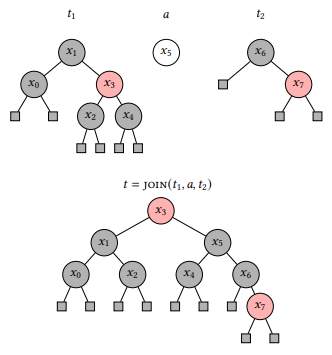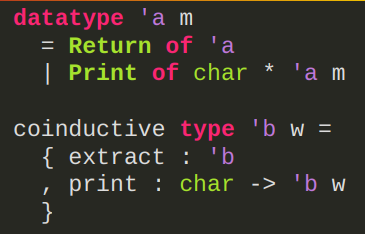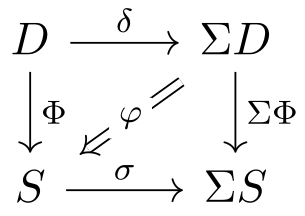publications
2025
- 📝 Preprint
 Abstraction Functions as TypesHarrison Grodin, Runming Li, and Robert HarperFeb 2025
Abstraction Functions as TypesHarrison Grodin, Runming Li, and Robert HarperFeb 2025Modular development of programs relies on the principle that library code may be freely replaced without affecting client behavior. While an interface mediating this interaction should require a precise behavior of its implementations, allowing for downstream verification of client code, it should do so in a manner that allows private algorithmic and representation choices to vary freely. In this work we demonstrate how such modularity can be achieved in dependent type theory using a phase distinction between private algorithmic content and public client-facing behavior. We observe that modalities associated with such a phase distinction and their corresponding theorems, particularly noninterference and fracture, give rise to precise descriptions of common constructions surrounding algorithms and data structures. Using a modal construction to classify types that sufficiently restrict client-facing behavior, we use the noninterference property for the phase to state and prove a modularity property guaranteeing that implementations may be freely replaced without affecting behavior. We then cast the fracture property in the light of abstraction functions, showing internally that every type consists of a private algorithmic component, a public behavioral component representing an abstract data type, and an abstraction function between them that is uniformly activated by the behavioral phase for streamlined verification of client correctness. Finally, we use phased quotient types to ergonomically mark private data for behavioral deletion. We situate this development in a univalent adaptation of Calf, a dependent type theory for cost analysis, in order to amplify these points: beyond hiding private implementation details, we treat cost as a private matter that may be varied freely without affecting the behavior of clients.
2024
- Amortized Analysis via CoalgebraHarrison Grodin, and Robert HarperElectronic Notes in Theoretical Informatics and Computer Science, Dec 2024
Amortized analysis is a cost analysis technique for data structures in which cost is studied in aggregate: rather than considering the maximum cost of a single operation, one bounds the total cost encountered throughout a session. Traditionally, amortized analysis has been phrased inductively, quantifying over finite sequences of operations. Connecting to prior work on coalgebraic semantics for data structures, we develop the alternative perspective that amortized analysis is naturally viewed coalgebraically in a category of cost algebras, where a morphism of coalgebras serves as a first-class generalization of potential function suitable for integrating cost and behavior. Using this simple definition, we consider amortization of other sample effects, non-commutative printing and randomization. To support imprecise amortized upper bounds, we adapt our discussion to the bicategorical setting, where a potential function is a colax morphism of coalgebras. We support algebraic and coalgebraic operations simultaneously by using coalgebras for an endoprofunctor instead of an endofunctor, combining potential using a monoidal structure on the underlying category. Finally, we compose amortization arguments in the indexed category of coalgebras to implement one amortized data structure in terms of others.
- Decalf: A Directed, Effectful Cost-Aware Logical FrameworkProceedings of the ACM on Programming Languages, Jan 2024
We present decalf, a directed, effectful cost-aware logical framework for studying quantitative aspects of functional programs with effects. Like calf, the language is based on a formal phase distinction between the extension and the intension of a program, its pure behavior as distinct from its cost measured by an effectful step-counting primitive. The type theory ensures that the behavior is unaffected by the cost accounting. Unlike calf, the present language takes account of effects, such as probabilistic choice and mutable state; this extension requires a reformulation of calf’s approach to cost accounting: rather than rely on a "separable" notion of cost, here a cost bound is simply another program. To make this formal, we equip every type with an intrinsic preorder, relaxing the precise cost accounting intrinsic to a program to a looser but nevertheless informative estimate. For example, the cost bound of a probabilistic program is itself a probabilistic program that specifies the distribution of costs. This approach serves as a streamlined alternative to the standard method of isolating a recurrence that bounds the cost in a manner that readily extends to higher-order, effectful programs.
The development proceeds by first introducing the decalf type system, which is based on an intrinsic ordering among terms that restricts in the extensional phase to extensional equality, but in the intensional phase reflects an approximation of the cost of a program of interest. This formulation is then applied to a number of illustrative examples, including pure and effectful sorting algorithms, simple probabilistic programs, and higher-order functions. Finally, we justify decalf via a model in the topos of augmented simplicial sets.
2023
- 📝 Preprint
 A Verified Cost Analysis of Joinable Red-Black TreesRunming Li, Harrison Grodin, and Robert HarperSep 2023
A Verified Cost Analysis of Joinable Red-Black TreesRunming Li, Harrison Grodin, and Robert HarperSep 2023Ordered sequences of data, specified with a join operation to combine sequences, serve as a foundation for the implementation of parallel functional algorithms. This abstract data type can be elegantly and efficiently implemented using balanced binary trees, where a join operation is provided to combine two trees and rebalance as necessary. In this work, we present a verified implementation and cost analysis of joinable red-black trees in calf, a dependent type theory for cost analysis. We implement red-black trees and auxiliary intermediate data structures in such a way that all correctness invariants are intrinsically maintained. Then, we describe and verify precise cost bounds on the operations, making use of the red-black tree invariants. Finally, we implement standard algorithms on sequences using the simple join-based signature and bound their cost in the case that red-black trees are used as the underlying implementation. All proofs are formally mechanized using the embedding of calf in the Agda theorem prover.
- Amortized Analysis via Coinduction (Early Ideas)Harrison Grodin, and Robert HarperIn 10th Conference on Algebra and Coalgebra in Computer Science (CALCO 2023), Sep 2023
Amortized analysis is a program cost analysis technique for data structures in which the cost of operations is specified in aggregate, under the assumption of continued sequential use. Typically, amortized analyses are presented inductively, in terms of finite sequences of operations. We give an alternative coinductive formulation and prove that it is equivalent to the standard inductive definition. We describe a classic amortized data structure, the batched queue, and outline a coinductive proof of its amortized efficiency in calf, a dependent type theory for cost analysis.
- PLunch

2022
- A Cost-Aware Logical FrameworkProceedings of the ACM on Programming Languages, Jan 2022
We present calf, a cost-aware logical framework for studying quantitative aspects of functional programs. Taking inspiration from recent work that reconstructs traditional aspects of programming languages in terms of a modal account of phase distinctions, we argue that the cost structure of programs motivates a phase distinction between intension and extension. Armed with this technology, we contribute a synthetic account of cost structure as a computational effect in which cost-aware programs enjoy an internal noninterference property: input/output behavior cannot depend on cost. As a full-spectrum dependent type theory, calf presents a unified language for programming and specification of both cost and behavior that can be integrated smoothly with existing mathematical libraries available in type theoretic proof assistants. We evaluate calf as a general framework for cost analysis by implementing two fundamental techniques for algorithm analysis: the method of recurrence relations and physicist’s method for amortized analysis. We deploy these techniques on a variety of case studies: we prove a tight, closed bound for Euclid’s algorithm, verify the amortized complexity of batched queues, and derive tight, closed bounds for the sequential and parallel complexity of merge sort, all fully mechanized in the Agda proof assistant. Lastly we substantiate the soundness of quantitative reasoning in calf by means of a model construction.



